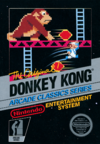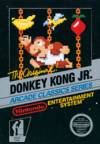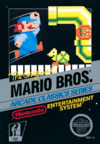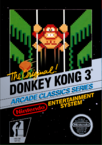Arcade Classics Series
From the Super Mario Wiki, the Mario encyclopedia
Jump to navigationJump to search
- Not to be confused with Nintendo Classics (also referred to as Classic Series).
The Arcade Classics Series is a marketing label for Nintendo Entertainment System ports of arcade games that were popular back in the 1980s. These games were released separately in Japan for the Family Computer but grouped as a series when released internationally in 1986. There are four ports belonging to Super Mario and Donkey Kong series of games. Unlike the arcade originals, these ports have two difficulty settings, A (beginner) and B (expert). Each cover has "The Original!" written in cursive above the title.
Main games[edit]
| Title | |
|---|---|
| Cover, original release and system | Synopsis |
| Donkey Kong | |
 Family Computer |
Plot is the same as the arcade version. There are a few programming changes to make it work for a NES such as the removal of 50m (50m was also removed in the Atari 2600, Intellivision, ColecoVision, and Atari 7800 versions) and cutscenes but the title screen received new music. This was one of the three launch titles for the Famicom along with Donkey Kong Jr. and Popeye. |
| Donkey Kong Jr. | |
 Family Computer |
Plot is the same as the arcade version. There are a few programming changes to make it work for a NES such as shortened cutscenes. Unlike the Atari 2600 version, the Jump Board Scene has not been removed in this version. Unlike the Intellivision and ColecoVision versions, Mario's Hideout has not been removed in this version. |
| Mario Bros. | |
 Family Computer |
Plot is the same as the arcade version. There are a few programming changes to make it work for a NES such as the removal of cutscenes, invisible platforms, and icicles. The phase progression corresponds with the international arcade version up to Phase 11. |
| Donkey Kong 3 | |
 Family Computer |
Plot is the same as the arcade version. There are a few programming changes to make it work for a NES such as shortened cutscenes. Some of the harder enemies appear in earlier rounds but Super Bees and Vine Eaters have been removed. |